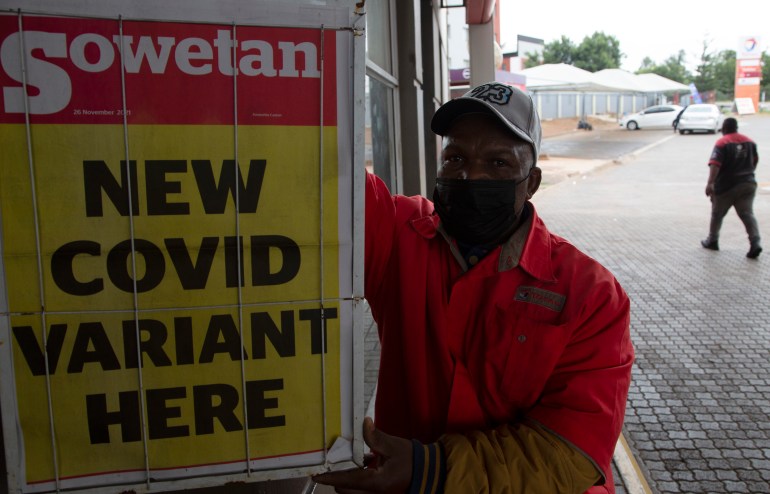‘Absolute chaos’ in South Africa as flights grounded over Omicron
New Omicron coronavirus variant leaves South Africans isolated as countries ban travellers from the region.

Johannesburg, South Africa – Disbelief and confusion washed over South Africa as the announcement of the discovery of the Omicron COVID-19 variant grounded flights and raised fears of a hard lockdown in Africa’s most developed economy.
Flights from the country to the United States, United Kingdom, and nations in Europe were swiftly banned after South African scientists officially announced the discovery of the virus strain on Thursday.
Keep reading
list of 4 itemsUK, Germany, Italy confirm cases of Omicron coronavirus variant
Cloth vs N95: Which coronavirus mask should you wear?
Is a third shot of coronavirus vaccine needed?
“This is absolute chaos. Nobody can tell us what is possible in terms of travel at this point,” said Steve Lawrence, a stranded traveller at OR Tambo, one of Africa’s busiest airports.
“Things are changing by the minute and we are left in the lurch. We had planned to stay in the United States for the month of December – and now we are stuck.”
Daily coronavirus infections have risen 13-fold since early November with 3,220 new cases reported on Saturday. Eight deaths brought the total to 89,791 in South Africa since the onset of the pandemic.
About 600 passengers on two KLM flights from Johannesburg to Amsterdam were left stranded on the runway at Schiphol Airport after panic set in following the announcement.
“Its naïve for developed countries to believe they can stop the spread of this variant with a blanket ban on countries in southern Africa. The virus has already found its way into these societies from individuals that haven’t even travelled to or come into contact with anyone from southern Africa,” Shabir Madhi, a South African vaccinologist, told Al Jazeera.
“The fact it was discovered here does not make it a South African variant – it was merely discovered here. In South Africa we have one of the globe’s best COVID sequencing capacities based on our experience with treating HIV and TB. We have been ahead of the game for a while now and we are thus a victim of our success.”
The abrupt grounding of flights has spooked the tourism industry with booking cancellations increasing directly following the announcement.
“I’m absolutely shellshocked. When we woke up on Friday morning everything was fine – now within 48 hours we have been banned and we are experiencing multiple cancellations,” Manuela Pallamer, owner at Mziki Safari lodge in the North West province, told Al Jazeera.
The South African tourism sector lost out on $10bn in bookings in 2020 because of a drop in foreign visitors, and is estimated to lose about $10m every week flights are suspended from key overseas tourist markets.
“We have a good local tourist market but if all of our foreign tourists cancel we’ll be truly devastated,” Pallamer added.

‘Horrible repeat’
The South African tourism sector is one of the main employers in the country, providing 4.5 percent of the entire population with a job and adds up to 3 percent of the gross domestic product (GDP) annually.
“This feels like the horrible repeat of a terrible movie,” Franck Leya from Honest Travel Experience told Al Jazeera.
“This industry was just beginning to come out of this crisis and two years later we still don’t have a solution to this virus and it’s affecting us all over again.”
Lobbying to lift the ban began furiously after the announcement of flight restrictions with the South African government and the private sector decrying being “punished for telling the truth”.
The Federated Hospitality Association of Southern Africa (FEDHASA) said it was working with South Africa’s government to have the bans lifted or challenge them in the courts.
“We are not going to lie down and just let it happen to us,” Rosemary Anderson, FEDHASA chairperson, told Al Jazeera.
“As an industry we are going to work with government and other industry bodies to legally challenge this. We believe we will be able to talk scientifically to show the UK and other countries that this does not make sense and is not OK.”
The South African government said any travel bans on the country were “misdirected” as the World Health Organization (WHO) also called for calm.
“New variants have been detected in other countries. Each of those cases have had no recent links with southern Africa,” Health Minister Joe Phaahla told a news conference on Friday.
“We feel some of the leadership of countries are finding scapegoats to deal with what is a worldwide problem.”
South Africa is now bracing for stricter local COVID restrictions, too, with President Cyril Ramaphosa set to address the nation on Sunday evening after meeting with the country’s coronavirus command council.
South Africa previously implemented one of the strictest lockdowns in the world, enforcing the complete ban of the sale of alcohol and cigarettes and restricting inter-provincial travel.
Only 23.8 percent of the South African population has been fully vaccinated while the average for the rest of the continent is just 7 percent.
“If government wants higher restrictions they are deliberately ignoring their effects – lockdowns have not prevented infections. It has only slowed them down,” said Madhi.
“If another one is implemented it will be a political decision not a scientific one. Any action needs to be measured and pragmatic and focused on areas where medical resources are coming under pressure from an increase in infections.”